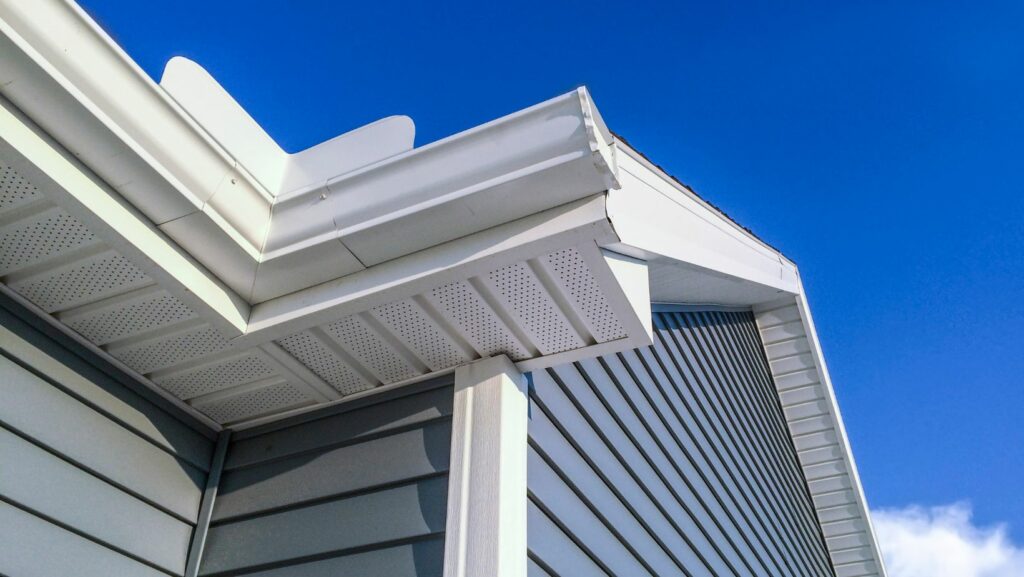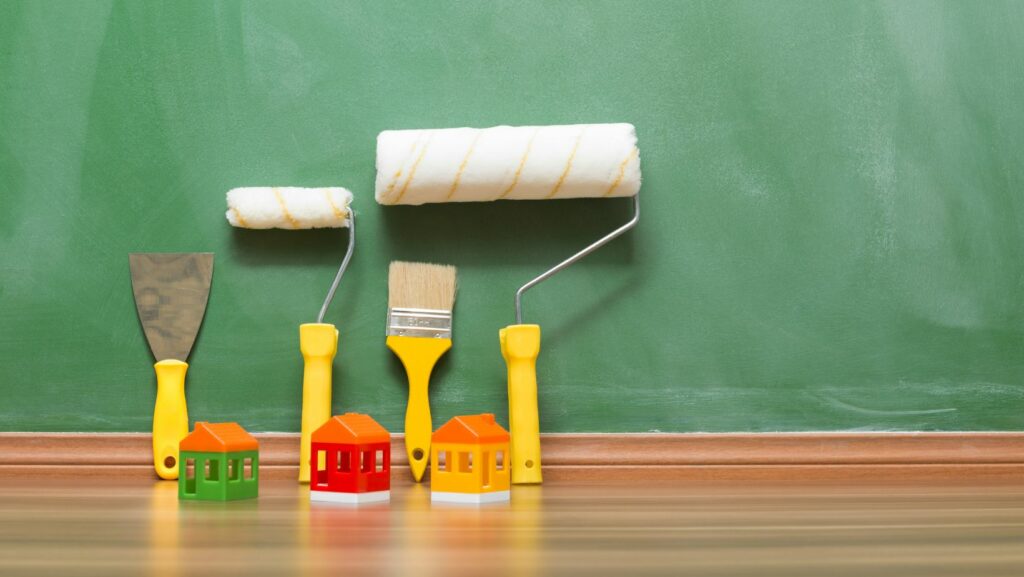Gutters play a crucial role in protecting your home from water damage by channelling rainwater away from the foundation, walls, and roof. Choosing the right material for your gutter system is essential, not only for the longevity of the gutters themselves but also for the overall health of your home. Some materials may offer exceptional durability but require frequent upkeep, while others might be low-maintenance but less sturdy. Balancing these considerations is key to making an informed decision that will serve your home well over the years.
Common Gutter Materials: Pros and Cons
To help you decide on the best materials for your gutters, let’s explore the common options available, along with their advantages and disadvantages.
Zinc
Zinc gutters are gaining popularity due to their longevity and low maintenance needs. They are resistant to corrosion and can last for decades without significant wear. Despite their higher initial cost, the long-term benefits make them a worthwhile investment. To get the most out of your zinc gutters, professional installation is essential. Ensure your roof stays in top condition with Marks Roofing, offering professional torch-on roofing installation and repair services in Vancouver.
Aluminum
Aluminum gutters are a popular choice due to their lightweight nature and resistance to rust. They are easy to install and come in various colours, allowing you to match them seamlessly with your home’s exterior. However, aluminum is prone to denting, especially during severe weather conditions. Over time, these dents can affect the gutter’s functionality and appearance, necessitating repairs or replacements.
Copper
Copper gutters are renowned for their durability and low maintenance requirements. They develop a unique patina over time, adding character and charm to your home. While copper gutters are more expensive upfront, their long-term benefits often justify the cost. The natural oxidation process that copper undergoes doesn’t affect its functionality, making it a long-lasting option that requires minimal upkeep.
Galvanized Steel
Galvanized steel gutters offer strength and durability at a relatively low cost. They are capable of withstanding harsh weather conditions, making them ideal for areas with heavy snowfall or rainfall. However, these gutters are susceptible to rust over time, especially if not maintained properly. Regular inspections and the application of protective coatings can extend their lifespan.
Vinyl
Vinyl gutters are an affordable option and easy to install, making them a favourite among DIY enthusiasts. They are available in various colours and do not require painting. However, vinyl is less durable than other materials and can become brittle in freezing temperatures, leading to cracks or breaks.
| Material | Pros | Cons |
| Zinc | Long-lasting, low maintenance | High initial cost, requires professional installation |
| Aluminum | Lightweight, rust-resistant, easy to install | Prone to denting, may require repainting |
| Copper | Extremely durable, low maintenance, aesthetic appeal | Expensive, may develop a patina over time |
| Galvanized Steel | Strong and durable, cost-effective | Prone to rust if not properly maintained |
| Vinyl | Affordable, easy to install | Less durable, can become brittle in cold weather |
The Best Materials for Durable Gutters
If durability is your primary concern, consider materials known for their resilience and longevity. Stainless steel and copper stand out as top choices for those seeking the best in durability. Both materials offer exceptional strength and resistance to various environmental factors, making them ideal for regions with harsh weather conditions.
Stainless steel, although heavier and more costly than other materials, offers remarkable durability. It withstands rust and corrosion, ensuring long-term functionality with minimal maintenance. Copper, on the other hand, not only provides durability but also enhances the visual appeal of your home. Its unique ability to develop a patina over time adds character and elegance to your property.
Aluminum is another excellent choice for those seeking a balance between durability and cost-effectiveness. While not as robust as stainless steel or copper, aluminum is still highly resistant to corrosion and requires less maintenance than other metal options. Its lightweight nature also makes it easier to install, reducing labour costs.
How Material Choice Affects Gutter Lifespan
The lifespan of your gutters is directly influenced by the material you select. Durable materials like copper and stainless steel can last for several decades, often exceeding 50 years with proper maintenance. This longevity can justify the initial investment, as you’ll avoid frequent replacements and repairs over time.

In contrast, materials such as vinyl and regular steel may have shorter lifespans, typically ranging from 10 to 20 years. While these options might be more affordable upfront, the need for earlier replacement can offset any initial savings. Additionally, the maintenance required to prevent deterioration can add to long-term costs.
It’s vital to consider not only the material’s inherent durability but also the specific environmental conditions it will be exposed to. Factors such as local climate, exposure to saltwater (in coastal areas), and the presence of overhanging trees can all impact the lifespan of your gutter system. Selecting a material that can withstand these conditions will ensure the longevity of your gutters.
Comparing Cost-Effectiveness of Gutter Materials
When evaluating the cost-effectiveness of gutter materials, it’s important to assess the initial cost, expected lifespan, and maintenance requirements. While some materials may seem costlier upfront, their durability and low maintenance needs can make them more economical in the long run.
| Material | Initial Cost | Expected Lifespan | Maintenance Needs |
| Aluminum | $$ | 20–30 years | Low |
| Vinyl | $ | 10–20 years | Moderate |
| Stainless Steel | $$$$ | 50+ years | Very Low |
| Copper | $$$$$ | 50+ years | Low |
| Galvanized Steel | $$ | 20–30 years | Moderate to High |
As you can see, materials like stainless steel and copper, while expensive initially, offer long lifespans and minimal maintenance requirements, enhancing their cost-effectiveness over time. In contrast, more affordable options like vinyl may require more frequent replacements and maintenance, impacting their overall value.
Maintenance Tips for Different Gutter Materials
Proper maintenance is essential for ensuring that your gutters function optimally and last as long as possible. Different materials require varying levels of care, so understanding the specific needs of your chosen material is crucial.
- Aluminum and Vinyl: These materials are relatively low-maintenance, but regular cleaning is necessary to prevent clogs. Inspect for dents or cracks and repair them promptly to avoid further damage.
- Stainless Steel and Copper: These durable materials require minimal maintenance. However, it’s essential to clear debris regularly and check for signs of corrosion or patina development, especially in copper gutters.
- Galvanized Steel: This material requires more attention due to its susceptibility to rust. Regular cleaning, repainting, and rustproofing can help extend its lifespan and maintain its appearance.
Regular inspections and cleaning will help prevent potential issues and ensure your gutters effectively protect your home.
Trends in Gutter Materials: What’s New in the Market?
The gutter industry continues to evolve, with new materials and technologies emerging to enhance performance and sustainability. The use of recycled aluminum and sustainable copper is increasing, reducing environmental impact.
Another trend is the integration of smart technology into gutter systems. Innovative solutions, like gutter sensors, can monitor water flow and debris buildup, alerting homeowners to potential blockages or damage. This technology can improve maintenance efficiency and prevent costly repairs.
Finally, advancements in coating technologies are enhancing the durability and aesthetic appeal of traditional materials. Coatings that provide additional protection against UV rays and corrosion are becoming more common, extending the lifespan of gutters and maintaining their appearance.
Making the Right Choice for Your Home
Choosing the best gutter material for your home involves careful consideration of various factors, including durability, cost-effectiveness, and aesthetic appeal. By understanding the pros and cons of different materials and how they affect installation and maintenance, you can make an informed decision that meets your specific needs. Whether you opt for the timeless elegance of copper, the resilience of stainless steel, or the affordability of aluminum, selecting the right gutter material is crucial for protecting your home from water damage. Regular maintenance and professional installation can further enhance the longevity and performance of your gutter system.



